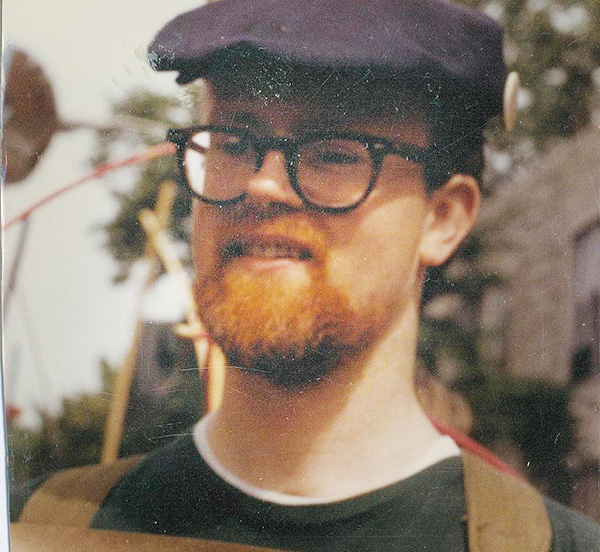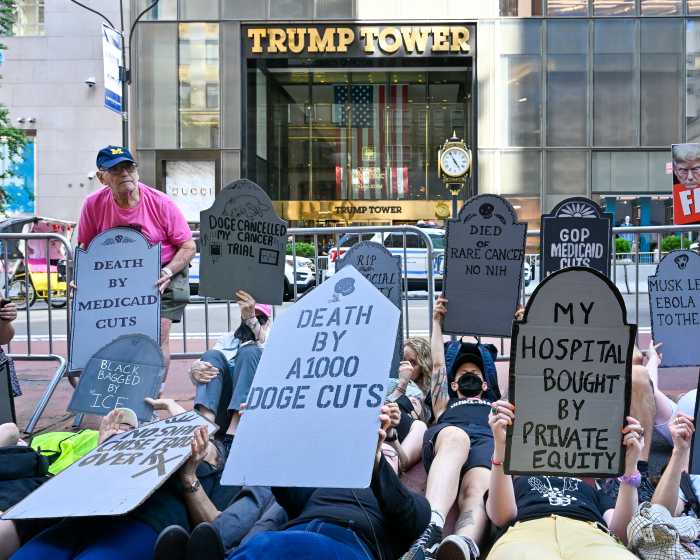
Jay Stockman in late 2014, at the VillageCare Rehabilitation and Nursing Center.
BY RAANAN GEBERER | If you go back 10, 20 or 30 years ago, Jay Stockman was a familiar face at any number of community groups in Chelsea. In a month, he went to more meetings and volunteer activities than most people do in a year.
It was even more remarkable because Stockman suffers from traumatic brain injury (TBI). As this article was being finalized late last year, Stockman had just returned home from a rehab facility, where he had been recovering from a foot injury and infection.
John “Jay” Stockman Jr. was born in 1946 and grew up in Harrington Park, NJ. His father was a machinery salesman, and his mother was a “staunch Republican” who was elected twice as the town’s tax collector. “I never believed in my mother’s ideology,” Stockman says. His sister, Melissa, died in the ’90s.
At Bergen Catholic High School, Stockman was a member of the oratory team, was considering a career in law and planned to go to Rutgers. Even today, echoes of New Jersey’s ’60s car culture creep into his conversation (he explains that the Beach Boys’ song “409” referred to Chevrolet’s 409 cc engine, and he also fondly remembers the “cool green Datsun” he owned in college).
In the fall of his senior year, however, came the accident that changed his life, when Stockman was talked into riding in a friend’s hot rod. “The car’s body was too lightweight for its powerful engine,” Jay recalls. The car crashed, and Stockman was in a coma for two months. After awakening, he found that President Kennedy had been assassinated, and was devastated. He had many months of rehab, but due to the efforts of his tutor, he was still able to graduate that June.
Stockman enrolled in Jersey City State College, transferred to St. Peter’s College and finally received his B.A. in 1971. He spent about six months in graduate school, intending to work in special education. VESID (Vocational and Educational Services for Individuals With Disabilities) got him a job in a day care center, but the job didn’t work out, and he began receiving Social Security Disability.
In the early ’70s he moved in with a roommate on W. 16th St. between Seventh and Eighth Aves. in Chelsea. Because of his economic situation, he applied for an apartment in NYCHA’s Elliott-Chelsea Houses. He moved there in November 1978.
Soon after moving to W. 16th St., Stockman became a volunteer at the Chelsea Neighborhood Clinic, a free storefront clinic on Eighth Ave. between 19th and 20th Sts. “At the time,” recalls Stockman, “there were very few medical services [other than private doctors’ offices] in Chelsea.” Everyone, even the doctors and nurses, was a volunteer, and most of the patients were working-class people. Stockman became part of a group of close friends who continued to meet for many years. As the idealistic1960s receded further into the past, the clinic found it harder and harder to attract volunteers, and it closed around 1980. “It was time to move on,” says Stockman.
Perhaps his longest-running volunteer activity was at the Church of the Holy Apostles’ soup kitchen, where he volunteered at lunch “three of four times a week.”
Stockman became aware of the soup kitchen after he switched his religious affiliation to Episcopalian and started attending Sunday services at Holy Apostles, which he fondly calls “H.A.” He won several awards for volunteering and took part in the soup kitchen’s Writers’ Workshop.
He also wrote articles for the workshop’s publication, “Soup Scoop,” on a variety of topics ranging from the benefits of volunteering to the High Line to the Buddhist chanting that became an important part of his life. However, after his condition began to take a turn for the worse about six years ago and he became wheelchair-bound, he had to phase out his lunchtime volunteering at the kitchen.
Stockman doesn’t recall how he joined the Chelsea Reform Democratic Club, but remembers that longtime leader Doris Corrigan lived nearby when he was still on 16th St. Speaking of the club’s competition with other local Democratic clubs in the early days of his involvement, he says, “We had the elected officials [district leaders] while the other clubs didn’t. That’s what made the club.” He served as the club’s secretary, taking minutes, until his condition began to deteriorate.

Jay Stockman in the 1970s.
While living in Elliott-Chelsea, Jay became heavily involved in the fight to open the Chelsea Recreation Center, whose current building is across the street from him on W. 25th St. The center was started in 1974, but construction stopped in 1976 due to the city’s fiscal crisis. “We were promised something by the city (when the original ‘rec center’ was torn down in 1964 to make room for a postal facility), but they failed to deliver,” says Stockman.
For years, Stockman was part of a group that circulated petitions, wrote letters, pressured officials and held meetings. Construction finally resumed in 2001. After the center opened, Stockman went swimming in the pool as a form of therapy for his legs.
After the US entered the Iraq War in 2003, Stockman, who hadn’t been active in the anti-Vietnam War movement, joined Chelsea Neighbors United to End the War (chelseaneighborsunited.com). As recently as last summer, Stockman was a familiar figure at the group’s weekly protests on 24th St. and Eighth Ave. As he did at the soup kitchen, he often contributed articles to the group’s newsletter. “President Obama Overdoes His War Power,” “More War Means Less Housing” and “The War in Afghanistan Is a Drug War” were among his pieces.
Other groups Stockman was involved with over the years included CAUSE, a social service agency that was sponsored by the Community Service Society, the Chelsea Inter-Agency Council (CIAC), the Hudson Guild, where he was a member of a monthly meeting group, and Disabled in Action, a civil rights organization that meets monthly at Selis Manor on 23rd St.
At this point, Stockman will certainly need more health services. However, he has the distinction of being able to look back on a life of service to Chelsea. He definitely has made his mark on the neighborhood.



































